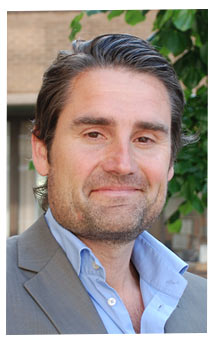Challenge of the NEET generation
Thu, 10 Nov 2011 16:18:00 GMT
 The challenges and opportunities experienced by young people not in education, employment or training are being charted in a three-year longitudinal study by academic researchers at the University of Huddersfield. The research, conducted by Dr Robin Simmons (pictured), Dr Lisa Russell and Dr Ron Thompson, takes place against a backdrop of record unemployment among 16- to-24-year-olds - which, by October 2011, had risen to 991,000.
The challenges and opportunities experienced by young people not in education, employment or training are being charted in a three-year longitudinal study by academic researchers at the University of Huddersfield. The research, conducted by Dr Robin Simmons (pictured), Dr Lisa Russell and Dr Ron Thompson, takes place against a backdrop of record unemployment among 16- to-24-year-olds - which, by October 2011, had risen to 991,000.
Supported by a grant of over £124,000 from The Leverhulme Trust, the project still has almost two years to run, but initial findings are already emerging, with a series of conference papers, journal articles and a book appearing in 2011. Dr Simmons also provided the keynote presentation at the Westminster Employment and Education seminar in London earlier this year.
Dr Simmons and Dr Thompson have co-authored a paper in the latest edition of the journal Educational Studies which summarises earlier research, exploring the lives of young people involved in Entry to Employment (E2E) programmes - work-based training provision devised for young people at risk of becoming NEET.
The two University of Huddersfield academics challenge many of the preconceptions about NEET young people engaging with E2E and similar provision.
They found that some E2E learners had been excluded for school or been persistent truants, due to disaffection or bullying. And a significant minority reported difficult personal circumstances, including domestic violence, youth offending and learning disabilities. But the authors also found many positives: half of the young people taking part in the research had experienced paid work; only a quarter had no GCSE passes; and almost all E2E learners had specific aspirations for employment or further education – many wished to progress onto university or to undertake professional training for specific vocations.
The research found also found that most NEET young people are not from families suffering from low aspirations or chronic unemployment.
“Far from being drawn from an ‘underclass’ with antisocial attitudes, little history of employment and an antipathy to education, the learners in our sample can be seen as ‘ordinary people’ from families not greatly different from working-class learners in more mainstream provision”.
The research also examined the attitudes of tutors working on E2E programmes. Dr Simmons and Dr Thompson found that, whilst most tutors were highly committed to helping marginalised young people to re-engage with education and training, many tended to share the “dominant view of NEET young people, regarding learners as fundamentally different to more fortunate young people, as non-academic and therefore in need of the practical, work-based curriculum of E2E”.
The paper finishes by explaining the need for more long-term research into the lives of NEET young people as they move between different forms of participation and disengagement – a project which they are now undertaking with support from The Leverhulme Trust.
- The article ‘Education and training for young people at risk of becoming NEET: findings from an ethnographic study of work based learning programmes’, by Robin Simmons and Ron Thompson is in the October 2011 edition of Educational Studies.







